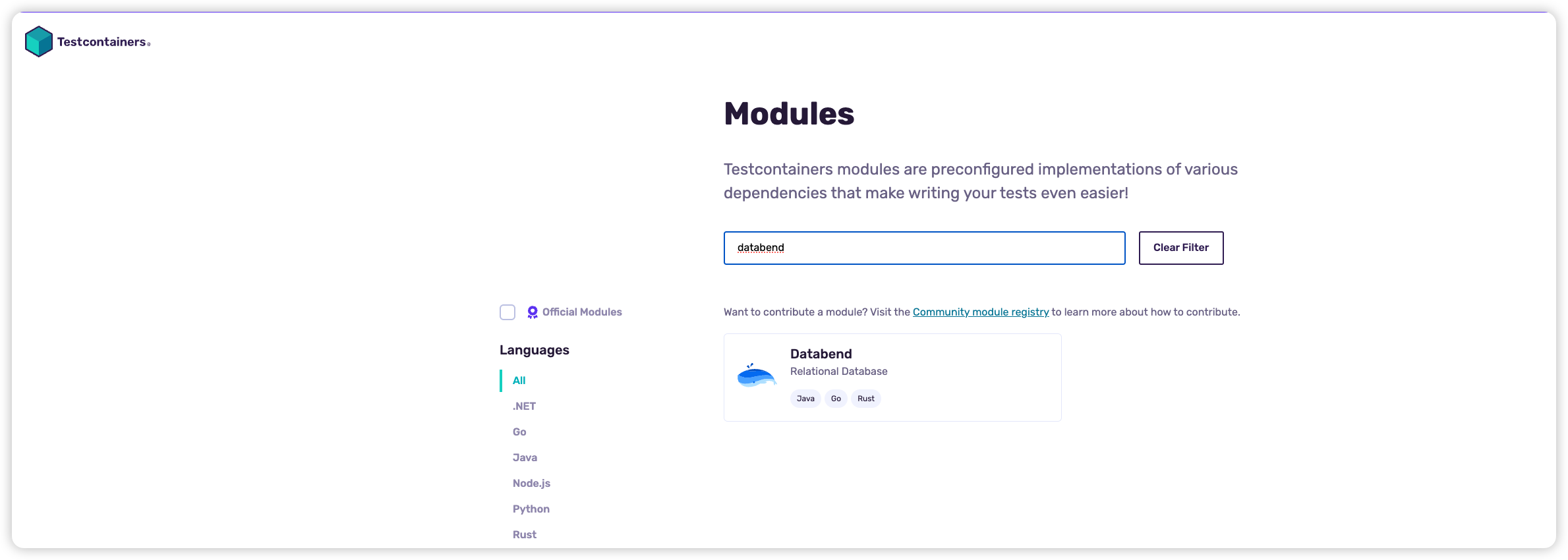Introduction to Testcontainers
Testcontainers is an open-source library that provides lightweight, disposable instances of databases, message brokers, web browsers, or any service that can run in a Docker container.
Core Features:
- Disposable: Can be discarded after testing
- Lightweight: Quick to start with minimal resource usage
- Docker-based: Leverages container technology for isolation
Main Use Cases:
- Database testing: MySQL, PostgreSQL, MongoDB, Databend etc.
- Message queue testing: RabbitMQ, Kafka, etc.
- Browser automation testing
- Testing any containerizable service
Using TestContainers for test cases helps avoid test environment pollution, ensures test environment consistency, simplifies test configuration, and improves test reliability.
This tool is particularly suitable for testing scenarios that depend on external services, enabling quick creation of isolated test environments.
Support Databend for Testcontainers

The Databend team has completed support for Databend data source in three major programming languages through PRs in testcontainer-java, testcontainers-go, and testcontainers-rs. This means developers can easily integrate Databend test environments in projects using these languages.
Prerequisites
- Docker installed in the operating environment
- Development environments for Java, Go, and Rust installed
Java Dependency Configuration
First, create a new Java Demo project. Here’s an example using Maven, adding databend testcontainers and databend-jdbc dependencies in pom.xml:
1 | <dependencies> |
For Gradle, use:
1 |
|
Creating Test Class
1 | Create a `TestContainerDatabend` test class with its constructor: |
We specified datafuselabs/databend:v1.2.615 as the Docker image for starting Databend, other databend versions available at databend docker hub, then set the username and password, and started the container service.
Here’s the test case:1
2
3
4
5
6
7
8
9
10
11
12
13
14
15
16
17
18
19
20
21
22
23
public void testSimple() {
try (Connection connection = DriverManager.getConnection(getJdbcUrl())) {
DatabendStatement statement = (DatabendStatement) connection.createStatement();
statement.execute("SELECT 1");
ResultSet r = statement.getResultSet();
while (r.next()) {
int resultSetInt = r.getInt(1);
System.out.println(resultSetInt);
assert resultSetInt == 1;
}
} catch (Exception e) {
throw new RuntimeException("Failed to execute statement: ", e);
}
}
public String getJdbcUrl() {
return format("jdbc:databend://%s:%s@%s:%s/",
dockerContainer.getUsername(),
dockerContainer.getPassword(),
dockerContainer.getHost(),
dockerContainer.getMappedPort(8000));
}
While running the test, we can see that testcontainers has started a databend container service in our system:

After the test completes, the container is immediately destroyed and resources are released.
Besides Databend, Testcontainers supports most databases and message queues available in the market, making it easy to build test suites that depend on these resources.
Go
Similarly, for Golang projects requiring Databend services, you can use testcontainers-go:1
2
3
4
5
6
7
8
9
10
11
12
13
14
15
16
17
18
19
20
21
22
23
24
25
26
27
28
29
30
31
32
33
34
35
36
37
38
39
40package main
import (
"context"
"database/sql"
"testing"
_ "github.com/datafuselabs/databend-go"
"github.com/stretchr/testify/require"
"github.com/testcontainers/testcontainers-go"
"github.com/testcontainers/testcontainers-go/modules/databend"
)
func TestDatabend(t *testing.T) {
ctx := context.Background()
ctr, err := databend.Run(ctx, "datafuselabs/databend:v1.2.615")
testcontainers.CleanupContainer(t, ctr)
require.NoError(t, err)
connectionString, err := ctr.ConnectionString(ctx, "sslmode=disable")
require.NoError(t, err)
mustConnectionString := ctr.MustConnectionString(ctx, "sslmode=disable")
require.Equal(t, connectionString, mustConnectionString)
db, err := sql.Open("databend", connectionString)
require.NoError(t, err)
defer db.Close()
err = db.Ping()
require.NoError(t, err)
_, err = db.Exec("CREATE TABLE IF NOT EXISTS a_table ( \n" +
" `col_1` VARCHAR(128) NOT NULL, \n" +
" `col_2` VARCHAR(128) NOT NULL \n" +
")")
require.NoError(t, err)
}
Rust
Since Databend is written in Rust, you can naturally use testcontainer-rs to quickly start a Databend container service in Rust projects:
1 | #[cfg(test)] |
Conclusion
For modern software development, reliable testing frameworks and toolchains are crucial foundations for ensuring code quality. With Databend’s multi-language support for Testcontainers, developers can more conveniently perform database-related integration testing, thereby improving overall development efficiency and code quality.
Whether using Java, Go, or Rust, Testcontainers provides reliable support for Databend developers’ testing work. We look forward to seeing more developers apply this powerful testing tool in real projects to build more robust application systems.


